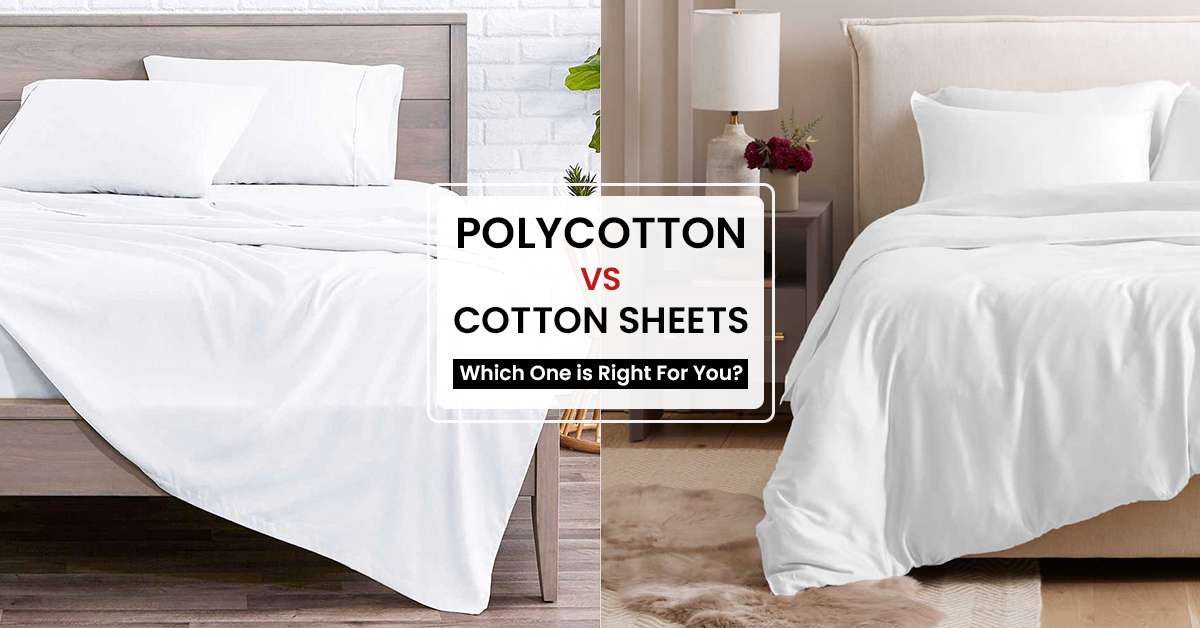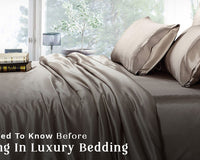Choosing the right sheets for your bed is crucial for a good night's sleep. With numerous options available, deciding between polycotton and cotton sheets can be overwhelming. In this blog post, we'll explore the characteristics of each fabric and the varieties of cotton used in sheets and help you make an informed decision about which is right for your bed.
What is Polycotton?

Polycotton is a blend of polyester and cotton fibres. The combination of these two materials aims to leverage the strengths of both, creating a fabric that is durable, wrinkle-resistant, and more affordable than pure cotton. Polycotton sheets often have a smooth texture and are known for their easy maintenance.
What is Cotton?

Cotton, on the other hand, is a natural fibre that comes from the cotton plant's seed. Known for its breathability, softness, and comfort, cotton has been a popular choice for sheets for centuries. The natural properties of cotton make it absorbent and hypoallergenic, providing a luxurious feel against the skin.
Types of Cotton Used in Sheets
Egyptian Cotton

Egyptian cotton is renowned for its superior quality and is often considered the pinnacle of luxury in bedding. Grown in the Nile River Valley, this cotton variety produces long-staple fibres, contributing to the fabric's strength, durability, and silky-smooth texture. Egyptian cotton white flat sheet are highly sought after for their exceptional comfort.
Pima Cotton

Pima cotton, also known as Supima cotton in the United States, is another high-quality cotton variety. Pima cotton is grown primarily in the southwestern United States and boasts long-staple fibres similar to Egyptian cotton. This results in sheets that are soft, durable, and resistant to pilling. Pima cotton sheets offer a luxurious feel without the same price tag as Egyptian cotton.
Cotton Vs. Polycotton Sheets: What Is The Difference?
Comfort and Breathability:
- Cotton: Known for its breathability, cotton sheets allow air to circulate, keeping you cool in warm weather and warm in cooler temperatures.
- Polycotton: While polycotton is breathable, it may not offer the same level of comfort in terms of temperature regulation as cotton.
Durability:
- Cotton: High-quality cotton, such as Egyptian or Pima, is known for its durability. With proper care, cotton sheets can withstand years of use without losing quality.
- Polycotton: Polycotton sheets are generally more durable than pure cotton due to the added strength of polyester fibres. They are less prone to wrinkles and can endure frequent washing.
Texture and Feel:
- Cotton: Cotton fitted sheets are prized for their soft and natural feel against the skin. The texture may vary based on the specific type of cotton used.
- Polycotton: Polycotton sheets often have a smoother texture and may feel less luxurious than high-quality cotton sheets.
Maintenance:
- Cotton: Cotton sheets may wrinkle more easily than polycotton but are easy to care for. Regular washing and ironing can help maintain their appearance.
- Polycotton: Polycotton sheets are less prone to wrinkles and are generally low-maintenance. They can be a practical choice for those with a busy lifestyle.
Conclusion
The right choice in the debate between polycotton and cotton extra deep mattress fitted sheets depends on your preferences and priorities. High-quality cotton, such as Egyptian or Pima, might be the ideal choice if you prioritise luxury, breathability, and natural fibres. On the other hand, if durability, affordability, and low maintenance are your key considerations, polycotton sheets could be the perfect fit for your bed.
FAQs
Are polycotton sheets suitable for all seasons?
Yes, polycotton sheets are versatile and can be suitable for all seasons. However, they may offer different breathability than cotton in extremely hot or cold temperatures.
Do cotton sheets wrinkle easily?
Cotton sheets, especially those with a higher thread count, may wrinkle more easily than polycotton. Regular care, such as ironing or wrinkle-release sprays, can help maintain a smooth appearance.
What is the difference between Egyptian cotton and Pima cotton sheets?
The primary difference lies in the origin. Egyptian cotton is grown in the Nile River Valley and is known for its long-staple fibres, while Pima cotton is grown in the United States, also featuring long-staple fibres. Both varieties offer high-quality sheets, with Egyptian cotton often considered more luxurious.
Can polycotton sheets be as soft as cotton sheets?
While polycotton sheets can be soft, they may not match the luxurious feel of high-quality cotton sheets. Cotton's natural softness and breathability are unique qualities that some may find unmatched by polycotton.
How should I care for my cotton or polycotton sheets?
Both types of sheets benefit from proper care. Follow the care instructions on the product label, wash sheets in cold water, and avoid using bleach. Dry sheets on a low heat setting or air-dry to maintain their quality.


